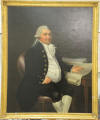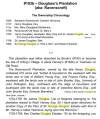Sir George Douglas of Springwood
Sir George Douglas, 2nd Baronet, (1754-1821) son of
Admiral
Sir James and Helen, da. of Thomas Brisbane of
Brisbane, Ayr. was a captain in the 25th Regiment of Foot and later
commanded the Kelso Volunteers.
Douglas, who sat for the
county on the interest of the 3rd Duke of Roxburghe, was described in
February 1788 as ‘dull, indifferent and inattentive’. Unlike his competitor
for the next election, John Rutherfurd, whose unpopularity was ‘positive’,
Douglas’s was ‘negative’: which served him well, for though both were
supporters of Pitt’s government he was, in his own words, ‘no party man,
wishing to see my friends in Parliament, without caring what side they take
when there’, and it was the support of Sir Gilbert Elliot and his Whig
friends that ensured Douglas’s success in the contest. The ensuing petition
against his return left him ‘full of care and fear’: the expense vexed him
and he was ‘not remarkably alert’ and would ‘not be very ready to speak,
unless ... strongly urged to it’.2 On 28 Mar. 1792 the committee of the
House seated him by the chairman’s casting vote.
Douglas continued
his unobtrusive support of the ministry. After a prediction that he would
vote for it, he was either absent or voted against the exemption of Scotland
from the Test Act, 10 May 1791. It was readily supposed by Sir Gilbert
Elliot’s friends—and Henry Dundas concurred—that he would stand down in
Elliot’s favour at the next election but, assured of the support of the
Dukes of Roxburghe and Buccleuch, he denied any such intention and was
returned unopposed in 1796. On 4 Jan. 1798 he was in the government majority
on the assessed taxes. In the preceding July Sir Gilbert Elliot thought—and
Henry Dundas again concurred—that Douglas might be bought out of his seat
with provision of £400 or £500 a year, but nothing came of it. On 30 May
1800 he made his maiden speech—on the adultery bill.
Douglas’s
support of Addington’s and Pitt’s second ministries was silent. He was in
the government majority on the additional force bill, 18 June 1804, and in
the minority on the censure against Melville, 8 Apr. 1805. His patron having
died in 1804, Douglas lost his standing in Roxburghshire and retired in
1806. He died 4 June 1821.
He sold the old estate of Friarshaw in
1788 and became MP for Roxburgh. His son, Sir John
James, succeeded to the
lands and baronetcy on the death of his father in 1821.
 |
Portrait Miniature of Sir George Douglas, Baronet by J.C.D.
Engleheart, 1821 |
 |
Written in paint on the document on the table, 'A Plan of
old Road Estate the Island of Antigua' and 'Reappraisment of Sir
George Douglas Estate 1789'
[Sir George Douglas of Springwood Park] |
Sir George Douglas of Springwood Park Roxburgh, MP for Roxburghshire
1784-1806, and absentee owner of 219 enslaved people on an as yet
unidentified estate on Antigua, whom in 1817 he had leased to Robert
Farquhar; in 1821 244 enslaved people who had been purchased from Sir George
Douglas were registered by Robert Briggs as attorney to Robert Farquhar, and
thereafter appear to have been attached to Cades Bay.
Sir George Douglas was grandson of George Douglas of Friershaw or Friarshaw,
and son of Sir James Douglas bart., naval commander and MP for Orkney and
Shetland 1754-1768. In the will of Henry Douglas planter of Antigua, proved
26/06/1753, Henry Douglas identified his brothers as George Douglas of
Friershaw Advocate and James Douglas of London merchant. Sir George Douglas'
interest in slave-property in Antigua flowed from this great-uncle Henry
Douglas, through Sir James Douglas' cousin Mary McNamara (formerly King, nee
Douglas), the daughter of Henry Douglas. One of her estates was described as
'Ravenscroft' in indentures of 1758 and 1763.
In his will proved in 1791, Robert Harvey left 'all my plantation
formerly called Mr Yeomans Old Road Estate in Cades Bay in Old Road,
Antigua' to his nephew Robert Farquhar. This appears to be the estate later
known as Cades Bay. One of Robert Farquhar's trustees was
Lord William Robert Keith Douglas.
In 1817, Robert Farquhar was shown as the owner of 166 enslaved people and
the lessee of a further 219 enslaved people from Sir George Douglas bart.;
by 1821, he had purchased the enslaved people from Sir George Douglas bart.
These entries have been inferred to relate to the estate appearing in the
compensation records as 'Cades Bay.' Sir George Douglas is reported by Vere
Langford Oliver to have inherited 'the Antiguan estate of Mrs McNamara.' Mrs
McNamara was his father's cousin, and the daughter of Henry Douglas of
Antigua: one of her estates was called Ravenscroft in 1758-1763.

Sir George Douglas, 2nd Bart of
Springwood Park
b 01.03.1754, d 04.06.1821
m. (16.10.1786) Elizabeth Boyle (d
15.02.1791/1801, dau of John Boyle, 3rd Earl of Glasgow)
Children of George and
Elizabeth DOUGLAS:
- Sir John James Scott-Douglas, 3rd Bt.
|
|


